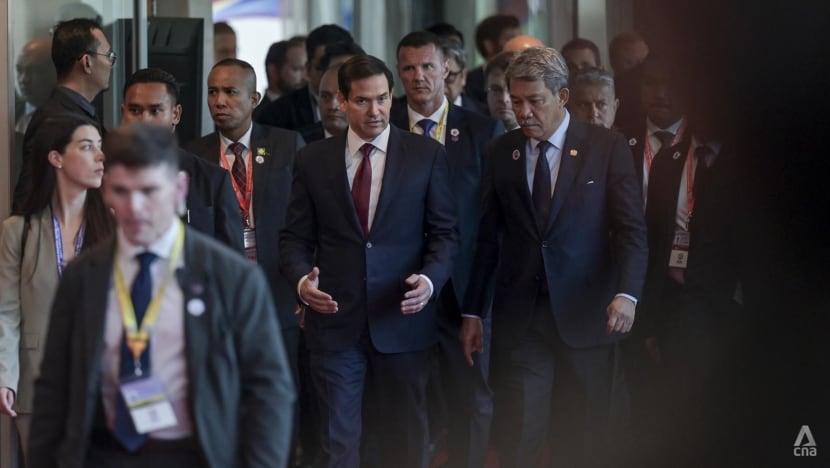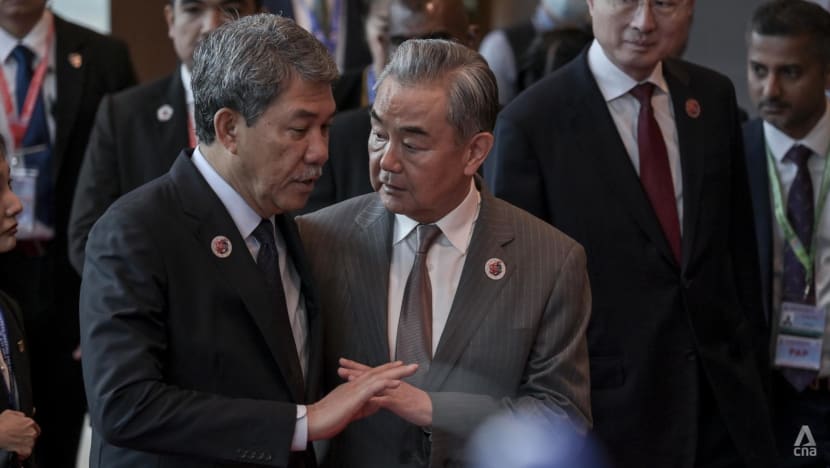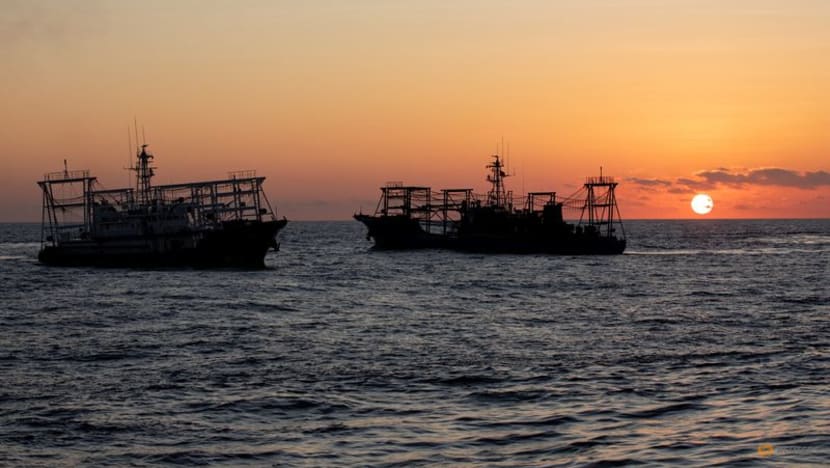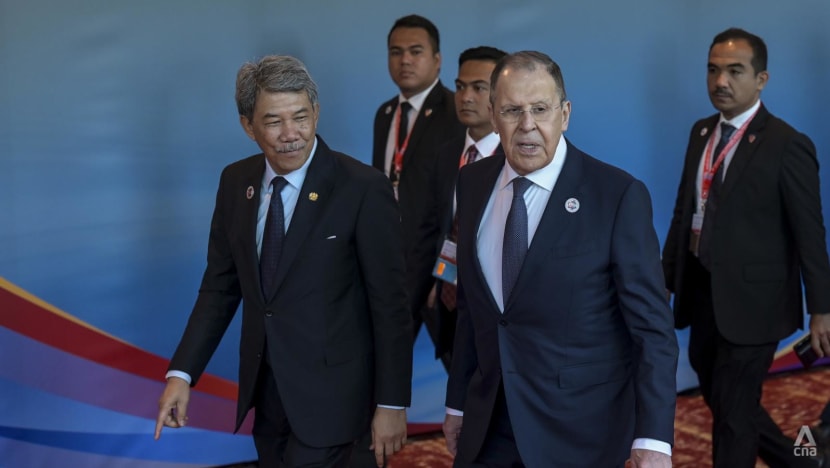US, China trade veiled barbs at ASEAN meetings, pledge support for regional bloc
KUALA LUMPUR: Top diplomats of the United States and China took veiled swipes at each other in separate meetings with the Association of Southeast Asian Nations (ASEAN) on Thursday (Jul 10) as they pledged support for the grouping amid geopolitical and trade uncertainty.
US Secretary of State Marco Rubio raised the issue of overlapping territorial claims in the South China Sea, a source of significant friction between China and several ASEAN nations, alongside allegations of unfair trade practices by Beijing.
Chinese Foreign Minister Wang Yi on the other hand spoke about a world in chaos, and the need for trade disputes to be resolved through dialogue, in what appears to be a critique of America’s unilateral imposition of tariffs.
The meetings come at a time of growing pressure as ASEAN - which has 10 member states - proves its relevance amid global uncertainty and a range of regional challenges.
Rubio, on his first visit to Asia, said the region remains a “focal point” of US foreign policy under the Trump administration.
“The US is a committed partner to ASEAN,” he said in opening remarks at the ASEAN post-ministerial conference with the US.
“When I hear in the news that perhaps the US or the world might be distracted by events in other parts of the planet, I would say distraction is impossible, because it is our view – our strong view and the reality – that this century and the next – the story of the next 50 years will largely be written here in this region, in this part of the world,” Rubio said.
Thursday’s dialogues occurred a day after US President Donald Trump's 90-day tariff pause concluded. Malaysia faces a 25 per cent tariff on exports to the US, Laos and Myanmar 40 per cent, Cambodia and Thailand 36 per cent, and Indonesia 32 per cent.
While Rubio did not address the issue of tariffs in his remarks to ASEAN counterparts, comments he made on the sidelines of the meet suggested that Southeast Asian countries may get "better" rates than others.

The US’ trade relationship with ASEAN supports 1.1 million jobs across Southeast Asia, Rubio said.
“So we fully understand the importance of the region, both to our prosperity and security and to each of your countries as well, and that's why we made clear that we intend to remain deeply engaged in this partnership, and want to continue to work with you on building on all of this,” he said.
US affiliates of majority-ASEAN owned firms also make significant contributions to the US economy, supporting close to 71,000 jobs and over US$300 million in research and development, and about US$2 billion worth of US exports, he added.
Following the meet, Rubio later told reporters: "I would say that when all is said and done, many of the countries in Southeast Asia are going to have tariff rates that are actually better than countries in other parts of the world.
"But these talks continue. There'll be talks next week with Japan. There's ongoing talks with virtually every country represented here."
US officials had said ahead of Rubio's trip that Washington was "prioritising" its commitment to East and Southeast Asia, and the US' top diplomat told reporters that America had "no intention of abandoning" the region.
"We've spent decades building these relationships," he said.
"Not only we're not going to walk away from them, we seek to expand them and build upon them with a part of the world that is essential."
Rubio added he might also meet with Chinese counterpart Wang.
In his remarks to his ASEAN counterparts, Rubio made reference to US’ dominance in advanced artificial intelligence (AI) technology, as well as efforts to ensure freedom of navigation in waters where there are overlapping sovereignty claims, without mentioning geopolitical rival China.
Freedom of navigation and overflight are essential to global trade, maritime security and peace, he said.
Without directly mentioning the South China Sea – of which China claims about 90 per cent with its nine-dash line – he said “claims of territorial sovereignty over vast areas of ocean space that are clearly within the maritime jurisdiction” of Brunei, Indonesia, Malaysia, the Philippines and Vietnam are “unlawful”.
They also “undermine regional peace and stability, especially when these claims involve reckless harassment of foreign vessels and dangerous intercepts of aircraft in international airspace”, he said.
On the digital front, Rubio said: “We're proud that the US continues to be the partner of choice on digital cybersecurity and emerging technologies, including AI and cloud computing, support pro-growth AI policy, while ensuring AI and cutting edge technologies are not co-opted into tools or fraud and censorship or mass surveillance.”
The US has sought to curb exports of state-of-the-art chips to China in recent years, concerned that they could be used to advance Beijing's military systems and undermine American dominance in AI.
Rubio said there was a need to tackle attempts to bypass such curbs.
“We also need to address the issue of trans-shipment, especially efforts to use third countries as pass-throughs to the United States, and efforts to use third countries to access sensitive US technology such as AI servers and chips,” he said.
“This influences perceptions of fairness and reciprocity and bilateral trade relationships.”

WANG YI ON RESOLVING TRADE DISPUTES
China’s Wang, meanwhile, spoke about promoting an “inclusive” global economy at the ASEAN post-ministerial conference with China on Thursday morning.
At a time of global turbulence and transformation, there was a need to draw lessons from history, Wang said.
“We must actively promote a world order that is equal and well-governed, and economic globalisation that is inclusive and beneficial for all, steering the international system toward greater fairness and justice,” he said in his remarks.
China also believes economic and trade differences should be resolved through equal dialogue and mutual benefit, safeguarding countries’ dignity and not be at the expense of the interests of third parties, Wang said, as reported by China Daily.
China has in recent days denounced parties that are considering striking tariff reduction deals with the US that cut Beijing out of their supply chains.
On the South China Sea, he noted the third reading of the Code of Conduct has been finalised, “effectively managing differences and safeguarding overall maritime stability”.
Wang, who’s China’s top diplomat as director of the Central Committee Foreign Affairs Commission Office in China’s Communist Party, said the South China Sea is the common home of regional countries, rather than a "gladiatorial arena" for major powers, reported China Daily.

He added that China is willing to expand cooperation with ASEAN countries in areas such as marine environmental protection, navigation safety, maritime law enforcement and key marine infrastructure.
It is willing to fully implement the Declaration on the Conduct of Parties in the South China Sea, and advance consultations on the Code of Conduct in the South China Sea, Wang said.
“The world is in chaos today, and the peace and stability of our region are precious and should be firmly protected. We must never allow geopolitical conflicts and group confrontations to be introduced into Asia,” said Wang, adding that China has always regarded ASEAN as a top priority in its neighbourhood diplomacy.Wang said 2025 marks a fruitful year for ASEAN-China cooperation. Negotiations on the China-ASEAN Free Trade Agreement Version 3.0 have completed and the pact is expected to be signed later this year, he said.
He held up the ASEAN-China-Gulf Cooperation Council Summit held in May as a model of cross-regional collaboration.
On the scourge of scams and transnational crimes, Wang said China has deepened security collaboration with Myanmar, Laos, Thailand and other partners to combat the issue.
Meanwhile, Chinese President Xi Jinping’s visits to Vietnam, Malaysia and Cambodia earlier this year have elevated bilateral ties and deepened people-to-people connections, Wang noted.
MEETINGS ALSO HELD WITH RUSSIA AND OTHER COUNTRIES
Both the US and China will take part in the 15th East Asia Summit Foreign Ministers’ Meeting and the ASEAN Regional Forum Foreign Ministers’ Meeting on Friday.
The meetings - from Jul 8 to 11 – take place under the theme of “Inclusivity and Sustainability”.
Rubio said the US has proposed an East Asia Summit leaders’ statement on combating scam centres, and remains committed to strengthen efforts to combat the problem.
On the conflict in Gaza, he said the US remains committed to achieving a durable ceasefire and believes “we are close to that now”.
“It seems at least the majority of the terms of such an agreement are in place, and that proximity talks should soon begin on implementation,” he said, thanking Egypt and Qatar in particular for their facilitation.
The US remains committed to an enduring peace throughout the Middle East, “changing the architecture of a region to one that's more stable”, he said.

ASEAN also held post-ministerial conferences with Australia, Canada, India, New Zealand, Japan, Russia, and the Republic of Korea on Thursday.
Russian Foreign Minister Sergey Lavrov called ASEAN a “reliable friend and like-minded partner”.
“We share a commitment to an equal-footing cooperation, building on the United Nations charter in its entirety … We support the central role of ASEAN in the region. The ASEAN-Russian relationship ensures stability in the Asia Pacific. In practice, it strengthens cooperation in security, policy, combatting new threats and challenges,” he said.
Disclaimer: Investing carries risk. This is not financial advice. The above content should not be regarded as an offer, recommendation, or solicitation on acquiring or disposing of any financial products, any associated discussions, comments, or posts by author or other users should not be considered as such either. It is solely for general information purpose only, which does not consider your own investment objectives, financial situations or needs. TTM assumes no responsibility or warranty for the accuracy and completeness of the information, investors should do their own research and may seek professional advice before investing.
Most Discussed
- 1
- 2
- 3
- 4
- 5
- 6
- 7
- 8
- 9
- 10